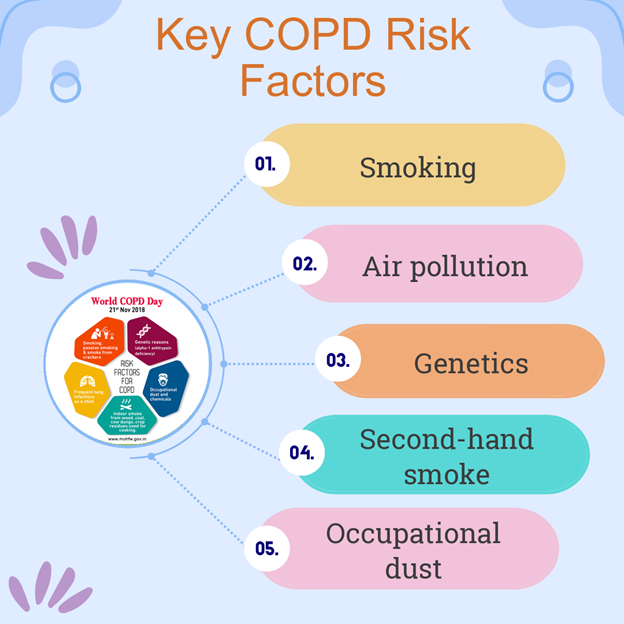Chronic Obstructive Pulmonary Disease, or COPD, is a lung disease. It blocks airflow and makes breathing hard for many people. Lots of folks may have it without knowing it’s there. Understanding COPD risk factors helps prevent or manage the disease effectively.
Recognizing the causes of COPD is very important for staying healthy. Knowing these risk factors helps in making better life choices. It puts people in control of their health, allowing them to breathe more comfortably.
This guide will deal with key points about COPD and its common causes. We will see how smoking, environment, and genes can affect us. This guide aims to inform readers so they can choose healthier paths.
Understanding the Fundamentals of COPD
COPD includes chronic lung problems like bronchitis and emphysema. These issues make breathing much tougher as time passes. This breathing trouble can also change everyday activities, making socializing harder.
COPD develops slowly and often sneaks up on people before they notice. Early signs might be a constant cough or getting chest infections more often. You might also feel out of breath doing simple tasks. Regular doctor visits can help catch it early.
Finding out about COPD early is important for better results long-term. Knowing early means you can take action to manage it sooner. This can help slow down the disease and keep life more normal.
Major Risk Factor: Tobacco and Other Inhalants
Smoking remains a leading cause of lung problems worldwide. The chemicals in cigarettes damage lungs, blocking airways over time. People who smoke face increased risks of developing breathing issues.
Non-smokers can also suffer if frequently exposed to cigarette smoke. This type of smoke, also called secondhand smoke, is extremely dangerous and harmful.
Workplace environments often have pollutants that workers inhale each day. For instance, dust and chemicals at work can pose long-term risks. Workplace safety measures are critical for reducing COPD risk factors.
Genes, Health Conditions, and Socio-Economic Impacts
Though lifestyle choices matter a lot, genes are also involved here. A condition named Alpha-1 Antitrypsin Deficiency (AATD) increases COPD risk. The risk can pass on even if you avoid bad habits.
Facing infections as infants or young can lead to COPD later. Smoke exposure when young harms lungs as they grow. Not eating well when growing hurts lung development too.
Folks in lower-income brackets often have more COPD risk factors. They may not get good healthcare or live where the air is bad. It’s important to make healthcare easier for everyone to access.
Lifestyle Choices and Environment: A Closer Look
Adopting basic habits like daily exercise and a balanced diet can help. Maintaining a good weight and avoiding smoking are wise choices indeed.
Air pollution, whether inside or outside, poses hidden health dangers today. Using some stoves indoors or car emissions outdoors raise COPD risk factors. Projects aimed at providing clean air and better airflow can reduce risks.
Limit kids’ exposure to smoke from charcoal cooking or indoor smoking. Encourage them to play where the air is cleaner and much healthier. Show a good path by following healthy habits they will also follow.
Conclusion and Recommendations to Minimize Risk
It’s important to know the copd risk factors like smoking and pollution. Quitting smoking helps relieve stress on the lungs and body overall. Avoid secondhand smoke and wear masks to help in bad air quality. Regular exercise and a healthy diet can keep lungs working well. Reduce exposure to dust and fumes at work to protect your health.
Routine check-ups play an essential role in finding COPD early on. Visiting doctors regularly helps keep track of lung health before issues arise. Spirometry tests show how well lungs are doing, helping in prevention plans. Early action is key to preventing further health problems.
Choose a healthier lifestyle with careful, informed decisions every day. This can significantly lower the copd risk factors faced. Seek advice from experts at Shri Sai Gajanan Hospital for best results. Their guidance can positively affect how you manage or prevent COPD issues. It’s always crucial to prioritize your health above everything.


